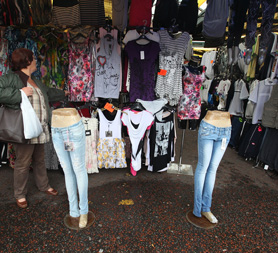Price rise in food and clothes blamed for inflation increase
A record surge in food and clothing costs has driven up inflation for November, as Gary Gibbon writes that parts of the government are still looking at the potential for a “double-dip” recession.

The Consumer Prices Index (CPI) went up to 3.3 per cent last month, from 3.2 per cent in October, according to the Office for National Statistics (ONS).
The increase was driven by a 1.6 per cent rise in the cost of food and non-alcoholic drinks and a 2 per cent increase in clothing and footwear costs, which are the highest increases for both sectors in an October to November period since records began. The price of furniture and household equipment also rose.
'Financial Plan B'
The Treasury is not disputing Philip Stephens' report in the Financial Times (FT) that Sir Gus O'Donnell is asking for a "Plan B" or "possible stimulus measures" to be worked up in case the economy stalls, writes Channel 4 News Political Editor Gary Gibbon.
Philip Stephens reports that the document suggests, amongst other things, that the Bank of England might have to "lend directly to business through buying commercial as well as government bonds." That's something that Mervyn King would be extremely wary about, to put it mildly.
This memo was very much not the Treasury's idea and not something that has hugely impressed it. Obviously Sir Gus O'Donnell is involved, as the author, but you would assume that Jeremy Heywood, the Prime Minister’s right hand man and "the real Deputy PM" or "the real PM" depending on who you talk to in Whitehall, would be involved too. Whoever is behind it has clearly annoyed George Osborne and he is not a man to be lightly crossed.
Read more on Gary Gibbon's blog on asking for a 'plan B' on the economy
The ONS reported anecdotal evidence that crop problems seen in countries including Russia earlier in the year could have contributed to the increase in the costs of flour, breakfast cereals and poultry costs. Droughts and wildfires in Russia over the summer led to an export ban on grain and wheat.
The City had predicted that clothing prices would hold, or even decrease, in November as many retailers introduced discounts earlier than normal. The ONS pointed to the rising cost of cotton, which is now at a 15-year-high, to explain the increase in prices.
“If you delay a gradual rise in interest rates for too long, we then suddenly find ourselves…trying to catch up and having to raise interest rates more sharply than people would like.” Monetary Policy Committee member Andrew Sentance
The Bank of England, which is tasked with bringing the rate of inflation down to a 2 per cent target, is said to be convinced that the high inflation is driven by temporary price shocks, such as volatile food and petrol costs. Policy makers had predicted there would be a spike in the cost of living towards the end of the year.
Other measures of inflation also increased. The headline rate of the Retail Prices Index (RPI) – which incvludes mortgage interest payments – now stands at 4.7 per cent, up from 4.5 per cent last month. The ONS said that the main factors affecting the CPI had an impact on the RPI.
Interest rates
The Monetary Policy Committee (MPC) has resisted lifting interest rates from a historic low of 0.5 per cent to curb inflation, as the economic recovery in the UK slows down.
But one member of the committee who has been arguing in favour of an increase in rates – Andrew Sentance – said the Bank needed to take the rise in inflation seriously.
“The worry that I would have is that if you delay a gradual rise in interest rates for too long, we then suddenly find ourselves as a Monetary Policy Committee trying to catch up and having to raise interest rates more sharply than people would like,” he told Channel 4 News.
“I share people’s concerns about inflation and I think we have learned in the past in the UK, by being tolerant of inflation creeping up it’s sometimes the beginning of a slippery slope whereby it actually continues to rise. So we don’t want to get into that situation.”
-
Latest news
-
As India goes to the polls in the world’s largest election – what do British-Indians think?6m

-
Tees Valley: Meet the candidates in one of the biggest contests coming up in May’s local elections4m

-
Keir Starmer says public sector reform will be a struggle7m

-
Nicola Sturgeon’s husband Peter Murrell charged with embezzlement of funds from SNP1m

-
Ukraine might finally get $60billion in American weapons and assistance to defend against Russia3m

-




